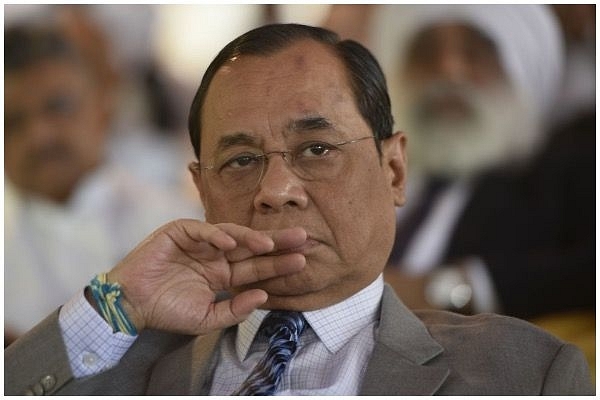Politics
Five Mistakes Made By CJI Gogoi In Dealing With Ex-Assistant’s Claims Of Misconduct
- The CJI may or may not be the victim of a conspiracy, but if he has done nothing wrong, he had nothing to fear from an independent investigation.
- He did not do his reputation any good by doing what he did. Now, every action of his, every judgement he delivers, will be scrutinised closely.

Chief Justice of India Ranjan Gogoi (Vipin Kumar/Hindustan Times via Getty Images)
The sexual harassment accusation against the Chief Justice of India (CJI), Ranjan Gogoi, may or may not finally stick, but the way the issue was handled certainly leaves a whiff of something amiss. Neither the CJI nor the bench he constituted on the matter did themselves proud.
On Saturday (20 April), the Chief Justice called an extraordinary special hearing to discuss something involving “great public importance” which could have a bearing on the “independence of the judiciary”. It ended up being an emotional and indirect denial by him of any misconduct with a former woman employee of his office. He did not announce any ruling at the end of the hearing, but allowed two brother judges on the same bench (Justices Arun Mishra and Sanjiv Khanna) to close the hearing with a bland statement that they will not pass any order. And yet, they requested the media to remove the objectionable content carrying the accusations of the former employee.
CJI Gogoi made at least five major mistakes.
First, a bench hearing an accusation against him cannot have him as the head, even assuming the CJI is the master of the roster and thus empowered to constitute such a bench. That he did not recuse himself when the bench wrote its non-order, but merely let Justice Mishra formally issue a statement is not good enough. Clearly, the Supreme Court, which was at the forefront of the Visakha guidelines on sexual harassment, failed when judging its own head this time. The brother judges effectively did not take independent action, even though they could have done so to redeem the court’s reputation.
Second, CJI Gogoi suggested that the accusation against him came at a time when several important cases and the elections were underway. “I don’t think this can be a plot of a junior assistant. There is a bigger plot. They want to deactivate the office of the CJI.” While we need not dismiss this argument as self-serving, a mere statement by someone alleging a conspiracy against him will not be by any court, even if that someone happens to be the CJI. If he has at least some proof of the conspiracy, he should have filed his complaint separately and asked the government or the investigative agencies to look into the matter before claiming the same in open court in a bench headed by him. Again, this did not make sense. He, however, finds support from Finance Minister Arun Jaitley.
Third, the CJI connected two unconnected facts. He disclosed that his bank account had only Rs 6.8 lakh as balance, and hinted that since they could not fix him by showing he had untold wealth, “they” have brought the sexual harassment allegation against him. This is a dubious linkage. A CJI may be absolutely incorruptible, but that does not automatically suggest that he is incapable of misconduct with women or immune to other kinds of crimes.
Fourth, the CJI suggested that the woman had a “criminal background” and that two FIRs had been filed against her. These may well be true, but again this amounts to misuse of his stature and position. In a sense the CJI is the accused here, and he sits in the powerful chair, not the woman. Any person in a power relationship with a junior employee has thus to be doubly careful about how he deals with the person if the latter accuses him of misconduct. By trying to cast doubts on her antecedents, the CJI did not do the right thing.
Fifth, the CJI was one of the four Supreme Court judges who addressed a joint presser in January 2018 alleging that the previous CJI, Dipak Misra, was arbitrarily assigning cases to specific benches, and that the CJI was merely the first among equals, not the judiciary’s boss. But CJI Gogoi has done nothing to overturn the power of the office, nor made even procedural changes to make the system of assigning cases any less arbitrary. That he himself headed the bench to defend himself against the charges made by a former junior assistant shows that he has not addressed the central issue of conflicts of interest.
The CJI may or may not be the victim of a conspiracy, but if he has done nothing wrong, he had nothing to fear from an independent investigation. He did not do his reputation any good by doing what he did. Now, every action of his, every judgement he delivers, will be scrutinised closely.
Support Swarajya's 50 Ground Reports Project & Sponsor A Story
Every general election Swarajya does a 50 ground reports project.
Aimed only at serious readers and those who appreciate the nuances of political undercurrents, the project provides a sense of India's electoral landscape. As you know, these reports are produced after considerable investment of travel, time and effort on the ground.
This time too we've kicked off the project in style and have covered over 30 constituencies already. If you're someone who appreciates such work and have enjoyed our coverage please consider sponsoring a ground report for just Rs 2999 to Rs 19,999 - it goes a long way in helping us produce more quality reportage.
You can also back this project by becoming a subscriber for as little as Rs 999 - so do click on this links and choose a plan that suits you and back us.
Click below to contribute.
Latest